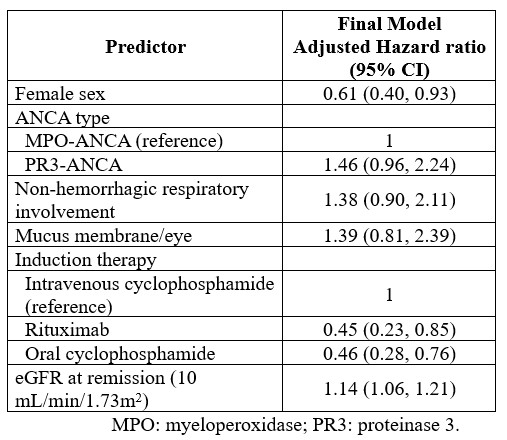Session Information
Session Type: Poster Session A
Session Time: 10:30AM-12:30PM
Background/Purpose: People with anti-neutrophil cytoplasm antibody (ANCA) associated vasculitis (AAV) vary in their risk of a relapse of disease. Estimating an individual’s risk may inform decision-making around their care.
Methods: We developed and internally validated a model to predict the risk a relapse of AAV using a cohort of patients from a randomized controlled trial with severe AAV defined as an eGFR < 50 mL/min/1.73m2 or diffuse alveolar haemorrhage. We estimated risk of relapse within two years of remission. Candidate variables to estimate risk of relapse were selected using Lasso regression in Cox proportional hazard time-to-event models. Non-parametric estimates of baseline survival at two years were used to obtain absolute estimates of risk of relapse. Frequency of variable inclusion in the model was assessed using the same procedure across 1000 bootstrap samples. We assessed model discrimination using concordance statistics, and calibration using the mean calibration slope.
Results: 649 participants met inclusion criteria of whom 100 relapsed within 2 years. The final model included participant sex, type of induction immunosuppression, ANCA serotype, non-hemorrhagic respiratory involvement, mucous membrane/eye involvement, and eGFR at remission (Table 1). Variables selected for inclusion in the final model were selected across 76% or more bootstraps. The optimism-corrected area under the receiver operator curve statistic was 0.71 (95% confidence interval [CI] 0.71-0.71). The mean calibration slope was 0.99 (95% CI 0.65-1.34). 18 (11.1%) of individuals at the lowest quartile of estimated risk of relapse experienced relapse and 58 (35.8%) of those at the highest quartile of estimated risk of relapse (Figure 1).
Conclusion: Our model accurately estimates the risk of relapse for individuals with AAV within two years after remission.
 Table 1: Cox proportional hazard regression model studying association between relapse within 2 years for individuals with ANCA-associated vasculitis. Overall model significance: Likelihood ratio chi-squared = 53.35, p-value < 0.001 for the final model and 69.78.
Table 1: Cox proportional hazard regression model studying association between relapse within 2 years for individuals with ANCA-associated vasculitis. Overall model significance: Likelihood ratio chi-squared = 53.35, p-value < 0.001 for the final model and 69.78.
.jpg) Figure 1: Kaplan Meier curve of relapse-free survival based on quartile of predicted risk of relapse as well as the risk of relapse contained within each quartile
Figure 1: Kaplan Meier curve of relapse-free survival based on quartile of predicted risk of relapse as well as the risk of relapse contained within each quartile
To cite this abstract in AMA style:
Junek M, Ibrahim Q, Merkel P, Vilayur E, Wald R, Fairhead T, Massicotte-Azarniouch D, Girard L, Pagnoux C, Khalidi N, Jayne D, Walsh M. Estimating two-year risk of relapse in individuals with ANCA-associated vasculitis in a randomized controlled trial of plasma exchange and glucocorticoids [abstract]. Arthritis Rheumatol. 2025; 77 (suppl 9). https://acrabstracts.org/abstract/estimating-two-year-risk-of-relapse-in-individuals-with-anca-associated-vasculitis-in-a-randomized-controlled-trial-of-plasma-exchange-and-glucocorticoids/. Accessed .« Back to ACR Convergence 2025
ACR Meeting Abstracts - https://acrabstracts.org/abstract/estimating-two-year-risk-of-relapse-in-individuals-with-anca-associated-vasculitis-in-a-randomized-controlled-trial-of-plasma-exchange-and-glucocorticoids/
